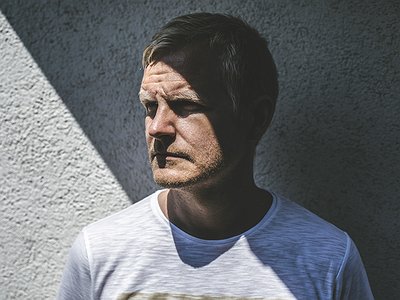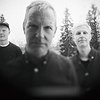Part 1
Name: Joona Toivanen
Nationality: Finnish, lives in Sweden
Occupation: Composer, pianist, improviser, educator
Recent release: The most recent release of the Joona Toivanen Trio, Both Only, was recently nominated for the Finnish EMMA Prize, the country's most prestigious musical distinction. The album is still available via We Jazz.
If you enjoyed this interview with Joona Toivanen and would like to stay up to date with his music, visit his official website. He is also on Instagram, bandcamp, and Facebook.
For a deeper dive, read our more recent interview with Joona about improvisation.
Where does the impulse to create something come from for you? What role do often-quoted sources of inspiration like dreams, other forms of art, personal relationships, politics etc play?
Besides music I love spending time in nature, often with my camera and/or a fly-fishing rod. Actually, fly fishing is very similar to playing jazz. To make the best out of the situation you have to be in the moment and improvise according to what’s happening around you.
I’m happy to be able to share these two passions with a bunch of fellow musicians / fishermen in the group called Jazz & Fly Fishing (there was a blog post written about us recently that pretty much covers the whole history of the group).
I see a lot of similarities and connections also between photography and music. A photo that really catches my eye is one that has some degree of resistance. The same kind of edge is something I try to emphasize in music. I’ve been doing a lot of prepared piano stuff, experimenting with different materials, magnets, and microphone techniques. The same kind of exploration process has been present in my photography: I have a small collection of vintage lenses that I adapt to modern cameras. I’ve also built my own pinhole lenses and been experimenting with different home-made filters and adapters.
The images are far from technically perfect, but there’s something else that has aesthetic values. This is probably totally subjective, but still, art is an expression of personal perspective. To me it makes a lot of sense to see the beautiful imperfections in music and photography as two sides of the same coin.
We did a music video for one of the Joona Toivanen Trio tunes ("Direction") together with my brother, bassist and a creative genious Tapani Toivanen. It’s based on my pinhole photography, combined with machine learning. We actually made a set of unique, numbered prints of the single frames of the video:
For you to get started, do there need to be concrete ideas – or what some have called a 'visualisation' of the finished work? What does the balance between planning and chance look like for you?
It’s a bit of both. Lately a lot of my composing work comes out of improvisation. I sit in my studio and record myself improvising. Out of these sketches I find phrases, ideas, and patterns that I later work on more methodically.
The idea for my first solo piano recording, Polarities, emerged when I was browsing through my old sketchbooks. I realized I had dozens of sketches that were never really finalized or had never found their way into the repertoire. So, I started working on those from a solo piano point of view.
It was a process I learned a lot from. I often advise my students to write down and save all their musical ideas, no matter how small or insignificant they may seem. You never know when you might need them.
Is there a preparation phase for your process? Do you require your tools to be laid out in a particular way, for example, do you need to do 'research' or create 'early versions'?
Earlier I had to start the practice / composing sessions by preparing my workplace. Move the piano into place, plug in some mics. A table for the computer, headphones, adapters. And the pen and the music paper.
Today I’m in a lucky position to have my own little studio in my backyard. Now I can have everything ready for whatever I want to do. The studio is small, but I have place for an upright piano and other keyboards (Rhodes, Nord Stage, toy pianos, midi keyboards etc.), a drum set and basic recording equipment.
During the years I’ve also gathered a bunch of random instruments – percussion, flutes, cittras and Finnish kanteles. I can basically grab whatever I need for the moment, start recording or write down ideas on paper. Sometimes I do multitrack recordings of the ideas I have or a soundscape background to improvise on top of, so the studio workspace is very flexible in terms of creating.
Then again, sometimes ideas pop out when traveling and then you use what’s available, voice memo on the phone, or just a paper and a pen. Here's a couple of tracks recorded in my home studio:
Do you have certain rituals to get you into the right mindset for creating? What role do certain foods or stimulants like coffee, lighting, scents, exercise or reading poetry play?
I’ve never experienced a direct connection between an action / ritual and creativity, although I believe the things I do and experience affect me and my creative process. Perhaps being away from the piano in right doses builds up a certain hunger for expressing oneself.
I’m a passionate fly fisherman and the fishing season also dictates when to write music. If the fishing conditions are good in early Summer and I have a free evening, writing music would be a total waste of time. My thoughts and concentration would already have left to the river even if I would stay by the piano.
I rather spend dark, rainy, windy winter nights in the shed and write music. But sure, all the experiences I gather from the riverside must play a part in all this.
What do you start with? How difficult is that first line of text, the first note?
Years ago, as a young musician, I could spend hours just exploring ideas, choosing, and developing the right ones and working for ages with tunes. Later, with a growing family (I have three kids and a house to take care of) I’ve learned to (=been forced to) work more efficiently.
It’s probably deadlines that dictate the first notes! Either there’s a recording session or a tour coming up, or I just make up a deadline. For example, a solo concert could be a good opportunity to write a set of new tunes, or I can decide to compose something to work on with my students. The first note just needs to be written down; it doesn’t really matter what it is. But it’s easier said than done.
I often advise my students to get through the first obstacles in writing: write first, evaluate later. It’s not important whether the idea is good or bad (what is good or bad anyway?). I genuinely believe any idea can turn into a masterpiece, only you find the right setting and framework to it.
Here's a live clip from a solo concert I did in the middle of the pandemic. I decided to write new music for this concert. A good deal of these tunes will also appear on an upcoming debut album with a group called “MIRE III” later in 2023.
I can give you an example of how we have worked with Joona Toivanen Trio. We have a long history together. We’ve played for some 25 years as a trio, starting as teenagers. When I started writing tunes for the trio, I would compose a tune, write a sheet, and we would practice it together. The arrangements were done together, and we planned them into last details. These tunes were then recorded, the best takes ended up on our albums and so on. I believe this is a basic modus operandi.
However, when planning the Both Only album we were sort of fed up with doing the same process all over again. So, we figured: what’s do our previous albums have in common - and could we do something differently? And we cooked it down to the compositions.
We had always had compositions to work with. What if we didn’t have any? So, we booked rehearsals at my studio. What we did was just improvising and recording everything. We would then go back to the recordings and find details that somehow sounded interesting. Later, we worked on these ideas, sounds and grooves, and these became the basis for the album.
We had a four-day-booking at the studio and did some tunes by improvising, listening, re-doing, “producing” etc. It felt like a fresh approach, and although the process was nothing but simple (at times we were struggling with ideas and how to re-invent the way of working). In the end, we were encouraged by the idea of challenging old concepts. For our next session (to be released later in 2023 on We Jazz Records) we hit the studio with no plan whatsoever, right in the middle of a tour.
That was yet another approach with this trio, you can evaluate later what you think!






